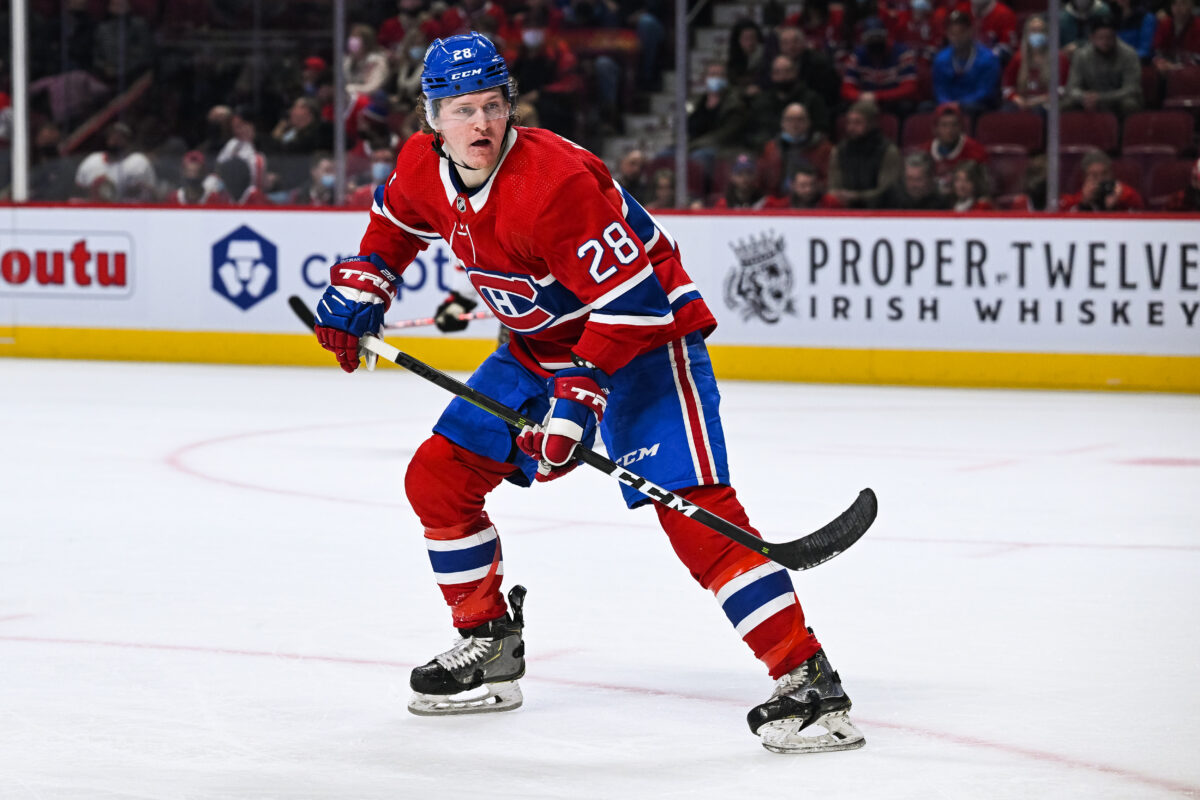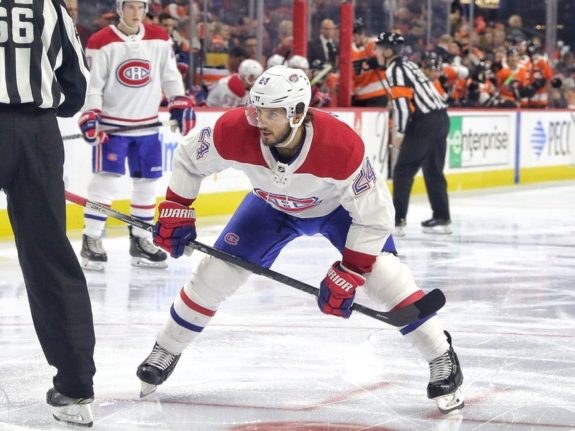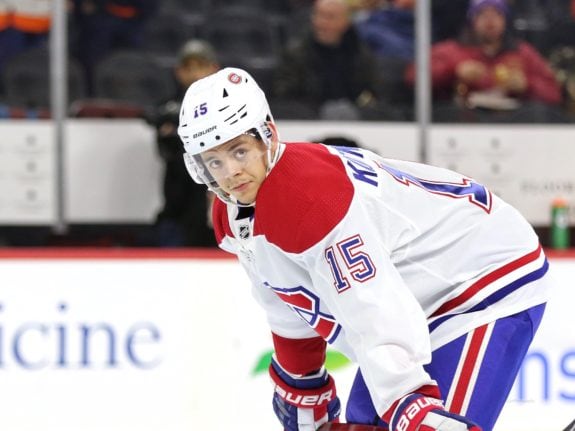It’s safe to say Montreal Canadiens forward Christian Dvorak’s got the confidence of interim head coach Martin St. Louis. It remains to be seen if the same is true of general manager Kent Hughes (and executive vice president of hockey operations Jeff Gorton).
Related: Canadiens Head Coach Martin St. Louis Not Another Mario Tremblay
Not only was Dvorak on the ice in the final minute of the Canadiens’ weekend loss to the New Jersey Devils. He set up Rem Pitlick for the dramatic game-tying goal to help the Habs earn a point in their eventual 3-2 shootout loss. Furthermore the assist itself was a thing of beauty. Maybe, just maybe this second-line-center thing can work out, after all.
Dvorak vs. Kotkaniemi
Of course, it was only one play. Overall, Dvorak’s admittedly been fairly underwhelming in his debut Habs season. In the interest of fairness though, the 20 points (nine goals) he’s scored in 41 games are in line with his career average up to this point. It’s just that, after he scored 31 points in 56 games with the Arizona Coyotes in what was a modest career season for him in 2020-21, many had hoped the now-26-year-old would be on the verge of an offensive breakthrough. No dice.

Evidently, what you saw in Dvorak was what you got: a short-term upgrade on Jesperi Kotkaniemi. That in and of itself isn’t necessarily an issue. However, when you, or, more accurately, ex-general manager Marc Bergevin, give up first (2022) and second-round (2024) picks for Dvorak, you’re expecting a little more offensive output. Thank G-d Bergevin got top-10 protection for the first-rounder at least.
Some may even say Dvorak wasn’t meant to substitute Kotkaniemi down the middle at all. Of course, there’s a logical cause-and-effect connection at work when, literally the same day Kotkaniemi officially becomes a Carolina Hurricane, Dvorak becomes a Hab. Nevertheless, there was a school of thought that Dvorak was brought in to replace Phillip Danault, as the team’s resident shutdown specialist, just with more offensive pop. Nearly one season in, it’s becoming clear that’s not the case.
Dvorak vs. Danault
Danault, a perennial top-10 finisher in Frank J. Selke Trophy voting who signed with the Los Angeles Kings during the offseason, just scored 20 goals for the first time in his career. On the plus side, Dvorak’s team-leading 56.7% in the faceoff circle has exceeded Danault’s 53.8%, but then again recent data suggests, generally speaking, faceoffs just aren’t as important as many old-school analysts tend to believe.
The comparison partly stems from reports Danault had rejected a potential six-year, $30 million extension offer from the Canadiens. He ended up signing with the Kings for an average of $5.5 million per season, so, as much as the Canadiens miss Danault’s veteran leadership down the middle and defensive awareness, you have to think it was actually a good non-signing by Bergevin.

It’s obviously a controversial take in the here and now, but consider the facts. Danault is 29. He’s under contract up until 34. He went on record saying he wanted to keep playing an offensive role with the Habs. Re-signing him to such a long-term, rich deal made little sense with Kotkaniemi still in the fold (he’d only go on to sign the Hurricanes offer sheet a month after Danault left). By all appearances, Kotkaniemi and Suzuki were the future top two centers of the team at the time (even if Bergevin couldn’t admit it). And giving that much money to a third-liner would have been a huge gamble.
In that respect, the comparison to Danault is flawed, because Dvorak always logically slotted in as the No. 2 center on the Habs upon his acquisition. The line-combination data says that’s almost exclusively how he’s been deployed too. He’s also younger and has a lower cap hit ($4.45 million). They’re different players. Obviously.
Canadiens Cap Concerns
Keep in mind, the Habs just traded away Artturi Lehkonen as a pending restricted free agent, in part out of cap cosideration. Lehkonen(!). As consistent of a player effort-wise as you’ll find on the team, maybe the NHL, who has a hit that’s half as big as Dvorak’s. Lehkonen was going to be due for a raise, sure. But he realistically wasn’t going to break the bank on his next deal.

The Lehkonen trade itself was good. Justifiable even, considering the return. It’s just that, in this cap-wary climate the Canadiens now find themselves, can they justify devoting $4.45 million per season to a second-line center scoring just ~0.5 points per game?
Hold that thought, because the quasi-realistic hope is the Canadiens address their lack of depth down the middle with the high pick they’ll likely be getting at the NHL Entry Draft. Assuming that’s what happens, the comparisons to Danault become all the more relevant. Just much less flattering to Dvorak if he’s being looked at under the lens of defensive effectiveness, if he does end up being pushed down the lineup.
The good news is, in such an instance, the Canadiens will have the benefit of a potential second-line center on an entry level deal. Dvorak is under contract for three more seasons (with a no-trade clause kicking in, in 2023-24). So, there is some logic in keeping him around. It’s just a less-than-ideal situation that originated with his acquisition in the first place, with Kotkaniemi’s new cap hit coming in conveniently at slightly higher than Dvorak’s ($4.82 million).

To be clear, the Canadiens still shouldn’t have matched the Kotkaniemi offer sheet. Bergevin still shouldn’t have let negotiations get to the point he would be offered one, but, alas, what’s done is done and Dvorak is a Hab, conceivably for the foreseeable future. He may not be the best fit based on the role he’s been assigned, especially considering the options the Habs had at their disposal. However, they can do far worse too. For where the Habs are on their timetable to contention again, he does the job… for now.